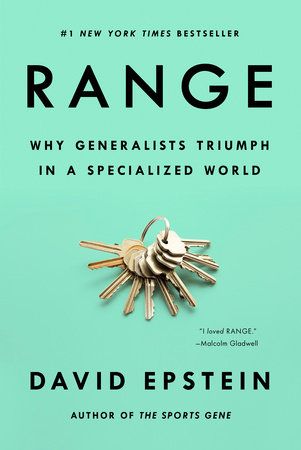Book Review: "Range" by David Epstein
Generalists are being recognized for their slower but more complete developmental path

Specialization has been the path to success for athletes, academics, scientists, and other professionals. It’s a major principle informing educational systems — majors, minors, etc. It has been fueled in popular culture by concepts like Malcolm Gladwell’s “10,000 hours” rule of thumb, academic and athletic marketing, and various approaches to parenting. A tonic seems overdue.
It arrived last year, via David Epstein’s excellent book, “Range: Why Generalists Triumph in a Specialized World,” which puts this all into a new perspective and throws cold water on the idea that long-term success is associated with specialization.

Epstein himself is a generalist, with a masters in environmental science, then a career as a crime reporter, an investigative reporter, a sports reporter, and now the author of best-selling non-fiction books. (Writing about things is a great way to learn about them.) So it’s no surprise that, almost by accident, Epstein was drawn into the research across multiple fields which shows that generalists have a slower path to success, more creativity as part of their ultimate success, better problem-solving skills, and then greater success for longer. Think Roger Federer vs. Tiger Woods, the example that opens the book. Woods’ story is about specialization, and Federer didn’t really commit to tennis until much later in life, almost choosing football (soccer). His footwork shows the benefits.
This opening in a way pivots from Epstein’s other excellent book, “The Sports Gene: Inside the Science of Extraordinary Athletic Performance.”
A generalist approach to sports has been the focus of a lot of research and reporting showing that the US’ approach to early and intense specialization leads to premature burnout, more frequent injuries, and greater dissatisfaction among young athletes. Meanwhile, in Norway, where young athletes pursue a diversified activity regimen and gradually decide which sport to pursue, if any, the athletes are a bit older, but less prone to injury, more likely to succeed, and happier. As a result, Norway punches far above its weight in the Olympics and other international competitions.
In science, generalists are also being recognized for their inordinate and welcome influence. They are the “translational science” people, with the ability to synthesize and analogize information across fields in ways specialists can’t. As Epstein notes, Nobel Prize winners are 22x more likely than their peers to have a non-science hobby, like ballroom dancer, actor, magician, or another type of performer. The same goes for nationally recognized scientists, but the range of hobbies is broader (as is the population of scientists).
There’s a price to generalization, however — slower attainment of apparent mastery. Generalists don’t win the spelling bee in middle school, the science prize in high school, or the lucrative engineering job out of college. They peak later, and for longer, because they are busy gathering all sorts of influences, and this takes time. As a Nobel Laureate in neuroscience — Santiago Ramón y Cajal — wrote about the topic more than a century ago:
To him who observes them from afar, it appears as though they are scattering and dissipating their energies, while in reality they are channeling and strengthening them.
There’s also a price to specialization, with research finding that specialists become less effective but more confident over time, a deadly combination, but one our enshrinement of expertise protects. The fealty to specialization currently being paid via curricula and educational approaches like STEM is also exacting a price, with students trained more in trades and less in the adaptable ways of thinking that will help them in the long haul.
Epstein explores a wide range of topics that can help those among us who are autodidacts or lifelong learners become more effective in learning; those of us who teach or coach to become more effective teachers or coaches; and, those of us raising children to understand and appreciate that it’s OK for kids to struggle and that short-term successes or failures can fool us about what’s really going on.
“Range” is an excellent read, and there’s something on nearly every page that taught, revealed, or explained things for me in a useful way. Epstein knows how to write a book like this, which is full of stories that illuminate key issues and elements of the theme, integrates research seamlessly, and structures insights cleanly.
Epstein has written a thorough, readable, and thoughtful tour of issues that affect education, strategy, management, parenting, personal pursuits, and more. “Range” is well worth reading.
Highly Recommend.